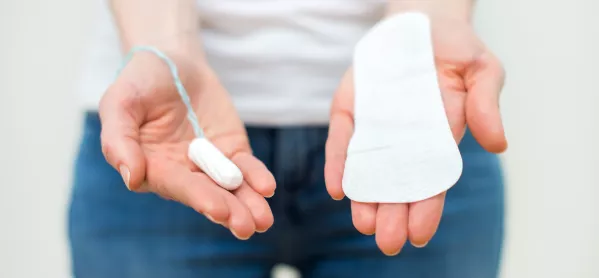In January, following Amika George’s Free Periods campaign, the DfE introduced a scheme enabling schools and colleges in England to order free menstrual products to distribute to students.
This was a landmark decision; it hailed a win not just for the fight against period poverty, but for the gradual erosion of the stigma surrounding periods.
But then the cycle was disrupted.
Period poverty for pupils
When coronavirus hit the UK and lockdown came into force, the majority of pupils were no longer in school. Boxes of menstrual products stacked up, undistributed and unthought-of in the rush to provide home-learning resources and FSM vouchers.
Consequently, it comes as no surprise that we are now hearing the same old devastating reports of ”newspaper, pillowcases or tea towels” being used in lieu of menstrual products, as many students across the country go without.
Like Marcus Rashford’s recent campaign to ensure all FSM children access to food vouchers over the summer holidays, we need to stand up for menstrual rights for our students, whether they are in school or out.
Free menstrual products
So how can schools - now and when they return to full reopening - better support our students?
1. Disseminate out of school
We have access to the products; students do not. Just as many schools have delivered lunches and FSM vouchers to students during lockdown, we need to ensure our vulnerable students receive menstrual products, too.
Highlight in your communication to parents/carers and students where and when they can receive products: designate a time, a place, or a staff member with responsibility for this.
2. Make products accessible in school
The days of scurrying to the school nurse to be furnished with a maxi pad to hastily stuff up your sleeve should be banished to the history books.
Ensure that all toilets are provided with a range of menstrual products - even better, these should be in the cubicles. This is not so they are hidden away, but it is where they are best placed - you do not always realise you have started your period until you see the mess it’s made in your underwear.
Having to leave your cubicle to grab a pad from the basket by the sinks is unhygienic, undignified and anxiety-inducing: an unnecessary and avoidable intrusion into a student’s day.
3, Make periods visible
We still need to shake off the invisibility cloak that covers periods, not just in toilets, but throughout students’ education.
PSHE is an obvious tool for change - menstruation education is for everyone and should be more than anatomical.
All students should understand how periods can affect people, from the pain of cramps to the emotions of hormonal flux.
Find opportunities to include these discussions in your curriculum, whether it is in biology, geography or English. As an English teacher, for example, I have used articles about period poverty as a way into the topic.
4. Mind your language
Normalising the discussion of periods is fundamental in ensuring that we raise a generation who do not cringe at talking about an essential human process, and equally who do not rely on dated stereotypes or accept menstrual ignorance.
In order to start eroding the taboo, we need to look carefully at the language we use to model talk about menstruation to our students.
The monikers “sanitary” and “feminine hygiene” are rapidly falling out of vogue, the connotations of “sanitary” implying an inherent unsanitary dirtiness to periods, and “feminine hygiene” erasing the experiences of trans boys and trans men who menstruate.
Talk about “periods” and “period products”, “menstruation” and “menstrual products”; overcome your own societally-conditioned embarrassment and ditch “time of the month”, “Aunt Flo” and the other euphemisms that exist to cover our perceived shame.
Call out students who engage with tired tropes about a grumpy woman being on her period, and explain to them how that sort of comment is rooted in misogyny and is unacceptable. The fight against period poverty begins in the classroom.
Sophie Harrold is a secondary English teacher in East Sussex, and the co-founder of period poverty charity A Bloody Good Cause.
